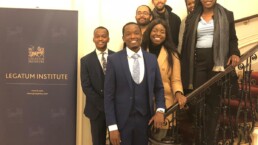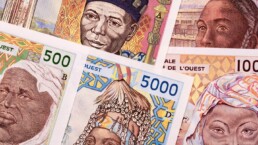School run by volunteers in the heavily polluted Makoko shanty town, a slum in Lagos. Photo credit: Jason Florio
Phiona Mutesi, a Ugandan chess player, born in Katwe, the largest of Kampala’s eight slums, who at age 9 was forced to drop out of school, because her mother could no longer afford to pay for her school fees. Phiona by some coincidence stumbled upon a chess programme run by Robert Katende, under Sports Outreach Institute, a Christian and sports mission, where she got introduced to the game of chess. She has since then, won the Ugandan women’s junior championship three times, has represented Uganda at four chess Olympiads, and is one of the first titled female players in Ugandan history. As if that were not enough, Phiona is the subject of a 2012 book and the 2016 film, Queen of Katwe. Her life has been completely transformed, as she has since managed to return back to school. Her success, is attributable to someone who gave their time to young people in a slum in Uganda.
When you hear the word philanthropist, what immediately comes to mind is probably a person or a family with more money than they know what to do with, who have found causes they are passionate about, and give towards those causes. That’s what most people would think.
The way I see it, philanthropy is doing as much good as you can with whatever you have at your disposal. Philanthropy is less about net-worth and more about heart and compassion for others, which moves you to want to promote their welfare. Africa has over the past few years seen an increase in the number of philanthropists, and this can be tied to the increase in wealth by a few Africans, it is estimated that Africa is now home to c.145,000 millionaires with a combined worth of US$800 billion. I think Africa has some of the greatest philanthropists, whose personal experiences have served as big motivators for their giving. Some of the biggest givers on the continent are individuals such as Strive and Tsitsi Masiyiwa who through their Higherlife Foundation, have to date impacted over 250,000 students through their scholarship programme; Tony Elumelu who is training and empowering 1,000 Entrepreneurs annually over a 10 year period, through the Tony Elumelu Foundation, under a US$100 million programme called The Tony Elumelu Entrepreneurship Programme (TEEP) and Mo Ibrahim who through the Mo Ibrahim Foundation has invested millions of dollars into promoting governance and leadership in Africa through the various programmes they offer including the famous Ibrahim Prize, awarded to a former Executive Head of State or Government, who would have proven to be an exceptional leader and role model for their country. The increase in the number of millionaires on the continent is not in proportion to the growing population and its needs, and this calls for more homegrown giving interventions.
As global geo-politics is shifting, there is a likelihood that less aid will flow into the continent. It is important for us as Africans to begin to better organize ourselves so we may begin to tackle some of the challenges we encounter. I have watched and listened to us (myself included) complain, when we haven’t received what we feel is adequate international media coverage and support, when disaster strikes on the continent. The truth of the matter is we are responsible for our own, we are the coverage, we are the donors and supporters, this is our problem and nobody else’s and it is up to us to mobilize resources among ourselves and come to each other’s aid when the need arises. Improving the quality and standard of life for someone else comes at a cost, usually in the form of money, time and/or reputation.
It’s quite unfortunate to witness a number of African governments failing in the area of service delivery, and this is leading to an increase of preventable diseases such as cholera and typhoid plaguing our communities. However if we take it upon ourselves to solve some of these challenges, there will be huge potential to supplement government services whilst positively reforming government cultures and more importantly impacting the lives of people.
Granted the political climate in certain parts of Africa makes it difficult to assist in particular areas, but most challenges in our communities and circles of influence are at a micro level. In some instances we shouldn’t wait for the government to intervene, as their intervention might not necessarily be required, we just need to step up, mobilize and act!
A gentleman by the name of Ed Cole said – “Maturity doesn’t come with age, but it comes with the acceptance of responsibility.” I’d like to encourage especially the young people in Africa to become more responsible, complain less, and take action for any crisis, be it political, financial, health or conflict that we might find ourselves in. We can’t just fold our hands and complain when we fail to receive foreign aid, we must be innovative and develop solutions for our challenges, using what is available at our disposal.
It is important for us to become more engaged in societal challenges at a micro level. We need to look at ourselves as problem solvers in our communities and nations. Fortunately tools are now available for those who wish to seriously engage in philanthropic work on the continent, thanks to organizations such as African Philanthropy Forum who have created a convening platform for African philanthropists, which provides them with material, in the form of a Toolkit designed to help make giving more effective and sustainable.
There is no greater stewardship than that of being stewards over one another and our communities. There is never a perfect moment to be givers, It was Arthur Ashe who said “Start where you are. Use what you have. Do what you can.”
Below are a few points which can assist us to begin cultivating a giving culture:
- Identify a need
- Commit to giving towards that need
- Start small by using your resources (financial; relational and/or skill) to meet the need
- Give of your time towards the need
- Be consistent in your giving.
Beyond giving money, philanthropy is about being actively engaged in coming up with solutions to societal challenges that include poverty and inequality. This requires a hands on approach, where different actors can lend their expertise, time and networks.
There are many other people who like Robert Katende have the skills and abilities, and all they need to do is create the time to give back to their communities. The more we exercise giving, the more it becomes a way of life and a culture. Some of the biggest givers I mentioned at the beginning of this article, started their journey before they had much money, and we can too. Let us promote a culture among ourselves as Africans, one where we, ‘Live to give’.
The views expressed in this article are those of the author alone and not the Future Africa Forum.
The views expressed in this article are those of the author and do not necessarily reflect the views of Future Africa Forum. Future Africa Forum is a pan-African policy think-tank and policy advisory consultancy headquartered in Nairobi, Kenya.



